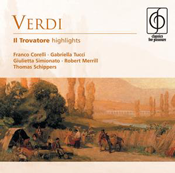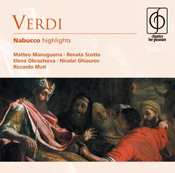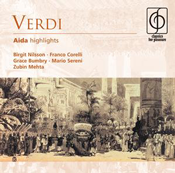
29 Jul 2008
Verdi on Classics for Pleasure, Opera Highlights
With these three CDs of highlights from three Verdi operas - Nabucco, Il Trovatore, and Aida — Classics for Pleasure gives a snapshot of the arc of his career.
The Sixteen continues its exploration of Henry Purcell’s Welcome Songs for Charles II. As with Robert King’s pioneering Purcell series begun over thirty years ago for Hyperion, Harry Christophers is recording two Welcome Songs per disc.
In February this year, Albanian soprano Ermonela Jaho made a highly lauded debut recital at Wigmore Hall - a concert which both celebrated Opera Rara’s 50th anniversary and honoured the career of the Italian soprano Rosina Storchio (1872-1945), the star of verismo who created the title roles in Leoncavallo’s La bohème and Zazà, Mascagni’s Lodoletta and Puccini’s Madama Butterfly.
Collapsology. Or, perhaps we should use the French word ‘Collapsologie’ because this is a transdisciplinary idea pretty much advocated by a series of French theorists - and apparently, mostly French theorists. It in essence focuses on the imminent collapse of modern society and all its layers - a series of escalating crises on a global scale: environmental, economic, geopolitical, governmental; the list is extensive.
Amongst an avalanche of new Mahler recordings appearing at the moment (Das Lied von der Erde seems to be the most favoured, with three) this 1991 Mahler Second from the 2nd Kassel MahlerFest is one of the more interesting releases.
If there is one myth, it seems believed by some people today, that probably needs shattering it is that post-war recordings or performances of Wagner operas were always of exceptional quality. This 1949 Hamburg Tristan und Isolde is one of those recordings - though quite who is to blame for its many problems takes quite some unearthing.
The voices of six women composers are celebrated by baritone Jeremy Huw Williams and soprano Yunah Lee on this characteristically ambitious and valuable release by Lontano Records Ltd (Lorelt).
As Paul Spicer, conductor of the Royal Birmingham Conservatoire Chamber Choir, observes, the worship of the Blessed Virgin Mary is as ‘old as Christianity itself’, and programmes devoted to settings of texts which venerate the Virgin Mary are commonplace.
Ethel Smyth’s last large-scale work, written in 1930 by the then 72-year-old composer who was increasingly afflicted and depressed by her worsening deafness, was The Prison – a ‘symphony’ for soprano and bass-baritone soloists, chorus and orchestra.
‘Hamilton Harty is Irish to the core, but he is not a musical nationalist.’
‘After silence, that which comes closest to expressing the inexpressible is music.’ Aldous Huxley’s words have inspired VOCES8’s new disc, After Silence, a ‘double album in four chapters’ which marks the ensemble’s 15th anniversary.
A song-cycle is a narrative, a journey, not necessarily literal or linear, but one which carries performer and listener through time and across an emotional terrain. Through complement and contrast, poetry and music crystallise diverse sentiments and somehow cohere variability into an aesthetic unity.
One of the nicest things about being lucky enough to enjoy opera, music and theatre, week in week out, in London’s fringe theatres, music conservatoires, and international concert halls and opera houses, is the opportunity to encounter striking performances by young talented musicians and then watch with pleasure as they fulfil those sparks of promise.
“It’s forbidden, and where’s the art in that?”
Dublin-born John F. Larchet (1884-1967) might well be described as the father of post-Independence Irish music, given the immense influenced that he had upon Irish musical life during the first half of the 20th century - as a composer, musician, administrator and teacher.
The English Civil War is raging. The daughter of a Puritan aristocrat has fallen in love with the son of a Royalist supporter of the House of Stuart. Will love triumph over political expediency and religious dogma?
Beethoven Symphony no 9 (the Choral Symphony) in D minor, Op. 125, and the Choral Fantasy in C minor, Op. 80 with soloist Kristian Bezuidenhout, Pablo Heras-Casado conducting the Freiburger Barockorchester, new from Harmonia Mundi.
A Louise Brooks look-a-like, in bobbed black wig and floor-sweeping leather trench-coat, cheeks purple-rouged and eyes shadowed in black, Barbara Hannigan issues taut gestures which elicit fire-cracker punch from the Mahler Chamber Orchestra.
‘Signor Piatti in a fantasia on themes from Beatrice di Tenda had also his triumph. Difficulties, declared to be insuperable, were vanquished by him with consummate skill and precision. He certainly is amazing, his tone magnificent, and his style excellent. His resources appear to be inexhaustible; and altogether for variety, it is the greatest specimen of violoncello playing that has been heard in this country.’
Baritone Roderick Williams seems to have been a pretty constant ‘companion’, on my laptop screen and through my stereo speakers, during the past few ‘lock-down’ months.
Melodramas can be a difficult genre for composers. Before Richard Strauss’s Enoch Arden the concept of the melodrama was its compact size – Weber’s Wolf’s Glen scene in Der Freischütz, Georg Benda’s Ariadne auf Naxos and Medea or even Leonore’s grave scene in Beethoven’s Fidelio.

With these three CDs of highlights from three Verdi operas - Nabucco, Il Trovatore, and Aida — Classics for Pleasure gives a snapshot of the arc of his career.
The composer’s first big success, Nabucco breathes fire in its lead soprano role, while elsewhere highlighting darker male voices. Il Trovatore, famously said to require the ‘world’s four best singers,’ bursts with so much melody that a highlights set seems like false economy. With Aida, the darker psychology and sharp orchestral color that would blossom in Otello and Falstaff appears.
 Renata Scotto’s impassioned Abigaille dominates the Ricardo Muti-led Nabucco. In fact, Matteo Manuguerra in the title role is not heard until track 6, an ensemble at the end of part two. Perhaps CfP should have retitled the disc “Abigaille.” Scotto’s tendency toward some wiriness in her high notes plays to her advantage here, underscoring the character’s fierceness and ego. In the major bass role of Zaccaria, Nicolai Ghiaurov provides the other substantial voice to make this set worthy. Veriano Luchetti and Elena Obraztsova sing the roles of the young lovers, but the tenor and mezzo only briefly appear in the selections CfP provides. Muti, typically for him, drives the music with intensity and exactness, an approach that sometimes pushes excitement over insight.
Renata Scotto’s impassioned Abigaille dominates the Ricardo Muti-led Nabucco. In fact, Matteo Manuguerra in the title role is not heard until track 6, an ensemble at the end of part two. Perhaps CfP should have retitled the disc “Abigaille.” Scotto’s tendency toward some wiriness in her high notes plays to her advantage here, underscoring the character’s fierceness and ego. In the major bass role of Zaccaria, Nicolai Ghiaurov provides the other substantial voice to make this set worthy. Veriano Luchetti and Elena Obraztsova sing the roles of the young lovers, but the tenor and mezzo only briefly appear in the selections CfP provides. Muti, typically for him, drives the music with intensity and exactness, an approach that sometimes pushes excitement over insight.
CfP fills the Il Trovatore highlights disc with 70 minutes of music, and still it feels too brief. Surely the soldier’s chorus could have been included? That quibble aside, a set as exciting, if occasionally manic, as this, should make any Verdi lover ask for more. Conductor Schippers does set some brisk tempos, but the visceral impact cannot be denied. Franco Corelli in his prime dominates the set, a truly heroic sound, not just in volume but in sheer masculine tone. Gabriella Tucci , in a rare plum recording assignment, sings an imposing Leonora, feminine and yet with a core of strength. Robert Merrill may not be in best form here - the “Il balen” starts off somewhat stiffly - but the imposing quality of the instrument continues to satisfy. Rounding out a fine cast, Giuletta Simionato’s Azucena not only has the requisite tension and edge but also many moments of great beauty. On the assumption that finding the complete set of this recording may be difficult, lovers of this opera should find a way to grab this highlights disc.
 The Aida CD starts abruptly with Corelli’s emphatic delivery of the recitative to “Celeste Aida.” There has been some controversial over the diminuendo on the aria’s final note, but whether it was a trick of the knobs or authentic, the excitement generated is not fake. In 65 minutes, this highlights disc can’t truly capture the expansive greatness of the opera - despite the inclusion of the confrontations scenes between Aida and her father, and then that between Radames and Amneris. CfP goes in for longer slices, with only 10 tracks. It’s good to hear Birgit Nilsson’s Aida, her power wielded with tact and more than enough suggestion of pathos in her voice too (although sometimes that takes the form of suspect intonation).
The Aida CD starts abruptly with Corelli’s emphatic delivery of the recitative to “Celeste Aida.” There has been some controversial over the diminuendo on the aria’s final note, but whether it was a trick of the knobs or authentic, the excitement generated is not fake. In 65 minutes, this highlights disc can’t truly capture the expansive greatness of the opera - despite the inclusion of the confrontations scenes between Aida and her father, and then that between Radames and Amneris. CfP goes in for longer slices, with only 10 tracks. It’s good to hear Birgit Nilsson’s Aida, her power wielded with tact and more than enough suggestion of pathos in her voice too (although sometimes that takes the form of suspect intonation).
Aida’s confrontation with Amneris is one victim of the music selections, which is particularly unfortunate considering how fine Grace Bumbry is in the role. Mario Sereni as Aida’s father makes less of an impression. Zubin Mehta leads the Rome opera forces in a performance as outsized as his two leads’ voices.
Your reviewer strongly recommends the Il Trovatore, but the other two sets have much worth hearing as well.
Chris Mullins